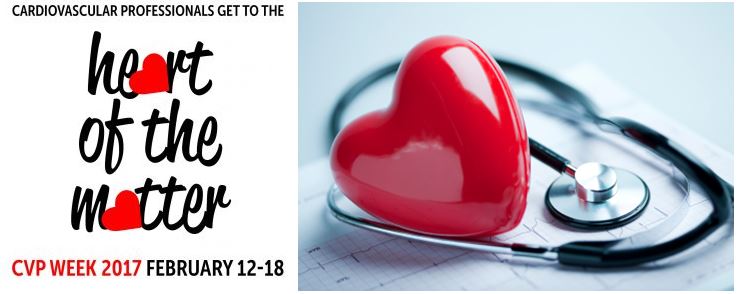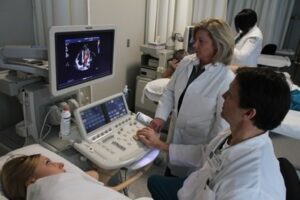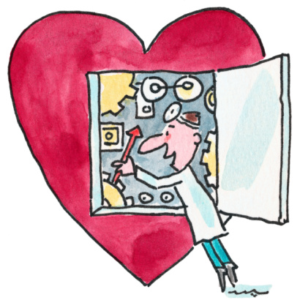Getting to the Heart of the Matter…Cardiovascular Professionals Week

Over time, the expression “getting to the heart of the matter” has been used in many contexts and genres to cut through the superficiality, and get to the very core, or underlying root of an issue. For those professionals in the dynamic and broad world of cardiology, ‘Cardiovascular Professionals Week’ provides the opportunity for them to have their voices heard; presenting and discussing new ideas and expanding the overall awareness among those in the healthcare community and beyond.
In Cardiology, like in every medical field, there have been giant leaps made and there are baby steps still to be tread. Over recent years, there have been breakthroughs in research, technology, and of course professional practice. One of the changes has been the promotion of front line workers, such as Cardiology Nurses, into more senior managerial positions. Some nurses have even taken positions as the CEO of a hospital (https://www.hhnmag.com/articles/7982-rn-ceos-gaining-favor?utm_campaign=01181). One of the many advantages of promoting from the front line, is that Nurses are able to apply valuable practical experience to a managerial or leadership role.
Another pressing issue annually in all realms of healthcare, is the costly use of testing and over hospitalization of patients. One effective measure that has been used in decreasing this cost, is increasing patients’ involvement in the crucial decision making processes.
Involving Patients in Shared Decision Making
 Recent research by the Mayo Clinic shows involving more patients in shared decision making, has shown to be effective in preventing unnecessary hospitalization. One increasingly popular measure used is the use of high-sensitivity cardiac troponin. This evidence based practice can rule out acute myocardial infarction (AMI) within one hour, with a high rate of accuracy and safety. After this test is done, the physician educates patients about their risk. The patients then, together with their physician, reach a shared decision, minimizing extraneous costly testing. (https://newsnetwork.mayoclinic.org/discussion/how-one-minute-could-prevent-hospitalization-unnecessary-tests-for-patients-with-low-risk-chest-pains/).
Recent research by the Mayo Clinic shows involving more patients in shared decision making, has shown to be effective in preventing unnecessary hospitalization. One increasingly popular measure used is the use of high-sensitivity cardiac troponin. This evidence based practice can rule out acute myocardial infarction (AMI) within one hour, with a high rate of accuracy and safety. After this test is done, the physician educates patients about their risk. The patients then, together with their physician, reach a shared decision, minimizing extraneous costly testing. (https://newsnetwork.mayoclinic.org/discussion/how-one-minute-could-prevent-hospitalization-unnecessary-tests-for-patients-with-low-risk-chest-pains/).
Subsequent and current research has lent support to these findings (https://jamanetwork.com/journals/jamacardiology/fullarticle/2526371). As Dr. Erik Hess cited in a Mayo Clinic press release argues, “When patients are involved with their care decisions, it is more likely they will get the right care for their concerns.”
Data showing the ‘Full Picture’ leads to informed decision making
Doug Brunk, writing for Cardiology News, reports that there have been growing public demands for a greater clarity of public reporting, especially for parents of children with congenial heart surgery. Mallory Irons, MD; a Study Investigator, speaking at a press briefing for the Annual Meeting of the Society of Thoracic Surgeons argues, that “There remain unanswered questions about the ‘optimal format’ and ‘content’ for pediatric surgery outcomes of public reporting for pediatric heart surgery outcomes.” (https://www.mdedge.com/ecardiologynews/article/130200/congenital-heart-disease/parents-seek-easily-understood-public).
 Irons adds that systems measuring quality, such as the STS star hospital performance rating system and others, measure data of more homogeneous patient groups and so do not show a full picture. Another problem with these sets of data is that they ignore parent input. This is of no help to parents if they are to make “informed choices about their child’s care.”
Irons adds that systems measuring quality, such as the STS star hospital performance rating system and others, measure data of more homogeneous patient groups and so do not show a full picture. Another problem with these sets of data is that they ignore parent input. This is of no help to parents if they are to make “informed choices about their child’s care.”
In response to this concern, Irons and her team developed a 43- question survey specifically for parents of children born with heart problems. Their research showed that out of the “1862 parents that participated, 1281 (69%) gave complete responses recorded in the final analysis”. The research came up with other significant findings such as “57% of the children were diagnosed with CHD prenatally”…. “63% underwent an initial repair in the neonatal period”… and “60% of families were referred to surgical center by a physician, while only 23% were transferred from their birth hospital.”
The introduction and use of new technology, particularly IoT innovations, have had a transformative effect; however, encrypting or guarding more sensitive information from Electronic Health Records has been a costly and exhaustive use of time.
How an electrograph reading can be used as cyber security tool
 Researcher Zhan Peng Gin, from the Thomas J. Watson of Engineering and Applied Science and his team, have found a simple, unique and effective solution to the problem of over complexed encryption. Gin discovered he could strategically use the patients’ individual Electrocardiograph reading; transmitting it through to electronic health records, could be strategically reused for data encryption-to lock, or unlock files. Gin argues that … “Through this strategy, the security and privacy can be enhanced while minimum cost will be added.” (https://www.dicardiology.com/content/heartbeat-could-be-used-password-access-electronic-health-records).
Researcher Zhan Peng Gin, from the Thomas J. Watson of Engineering and Applied Science and his team, have found a simple, unique and effective solution to the problem of over complexed encryption. Gin discovered he could strategically use the patients’ individual Electrocardiograph reading; transmitting it through to electronic health records, could be strategically reused for data encryption-to lock, or unlock files. Gin argues that … “Through this strategy, the security and privacy can be enhanced while minimum cost will be added.” (https://www.dicardiology.com/content/heartbeat-could-be-used-password-access-electronic-health-records).
The future for Cardiology looks like a positive one in which it is forever moving and changing. Today, nurses have a chance to use their patient focused approach to graduate to C-Level position; making crucial operational decisions through the trained eyes of someone who values patients’ experience.
In the world of research, as shown by Mallory Irons et al, data is effective at telling a story only up to a point, due to the lack of showing what is really happening in a heterogeneous population. However, when really taking note of real patient history and experience, Irons et al have shown that the potential is there to equip patients so they are able to make informed decisions about their healthcare.
Moreover, as shown by researchers from the Mayo Clinic, when physicians with the aid of less expensive, but more effective methods are able to form shared decisions with their patients, as Erik Hess argues, “… it is more likely they will get the right care for their concerns…”
Through the evolvement of technology or established tools, Researcher Zhan Peng Gin and his team, have shown new and exciting ways to use medical tools coupled with newer innovations. Inventive and critical thinking and technical skill can surely help to make Cardiology an even more recognized and heard voice in the world of healthcare. To all the Cardiovascular Professionals out there, thanks for your continued dedication to excellence and healthcare. Take some time off, you earned it. And be sure to check out this link to explore Merraine Group® current cardiology career opportunities.
Merraine Group® Cardiology Career Opportunities – https://www.merraine.com/job-board/?search_keywords=&selected_category=cardiology-careers&selected_location=-1
